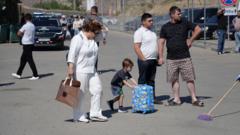Tensions between Iran and Israel escalate, with Iran reaffirming its right to self-defense, while diplomatic efforts in Geneva continue to face challenges amid military exchanges.
Iran Rejects Nuclear Talks Amid Ongoing Conflict: Foreign Minister's Stance

Iran Rejects Nuclear Talks Amid Ongoing Conflict: Foreign Minister's Stance
Iran's foreign minister insists on halting aggression before considering diplomacy with Western nations regarding the nuclear program.
Iran's Foreign Minister Abbas Araghchi stated that his country would not resume discussions on its nuclear program as long as it continues to face military aggression from Israel. This assertion came after Israel's Defense Minister suggested the conflict with Iran could extend for an extended period. Throughout Friday, the exchange of missile fire maintained momentum, with Iranian forces launching missiles towards northern Israel while the Israeli military responded by striking multiple Iranian locations.
In an address, Israel’s Foreign Minister Eyal Zamir warned citizens to prepare for a long-lasting conflict, citing "difficult days ahead." Araghchi, attending a meeting in Geneva with European diplomats, emphasized that Iran would only consider diplomatic channels once Israel ceases its military operations. He maintained that Iran's nuclear pursuits are peaceful and characterized Israeli strikes as violations of international law, reiterating Iran's commitment to defending itself.
The tension escalated as US President Donald Trump articulated a 14-day ultimatum for Iran to negotiate, raising concerns about possible US military action. Trump expressed skepticism about Iran's willingness to engage with European partners, dismissing the prospect of useful dialogue through European nations. UK Foreign Secretary David Lammy remarked on the dire situation in the Middle East, while French Foreign Minister Jean-Noel Barrot advocated for negotiations without preconditions. Furthermore, Iran faced continued strikes, with the Israeli military targeting missile storage sites in western Iran and reporting increasing casualty figures on both sides.
Amid these developments, the human toll continues to rise, further complicating the potential for de-escalation in the region. Iran's health ministry reported at least 224 fatalities, while NGO sources indicate a much higher count. The conflict intensifies as hundreds of ballistic missiles have been exchanged between the nations, underscoring the urgency for a resolution.





















